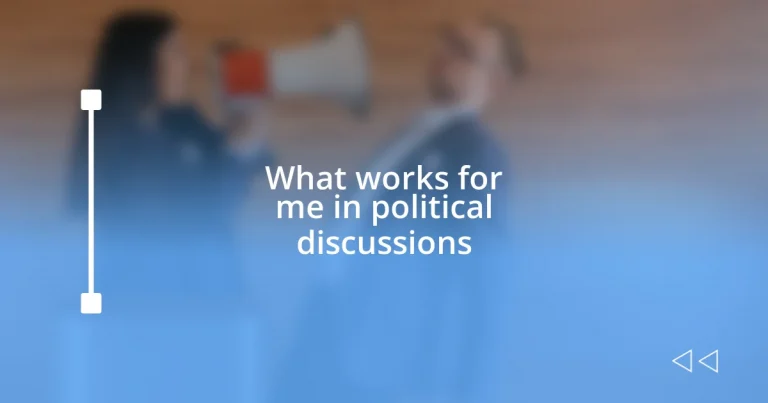Key takeaways:
- Understanding personal motivations and experiences in discussions fosters empathy and connection, promoting more meaningful conversations.
- Establishing common ground by identifying shared values and using personal stories can transform confrontational debates into collaborative dialogues.
- Maintaining a respectful tone, actively listening, and concluding discussions constructively creates an environment for ongoing dialogue and relationship building.
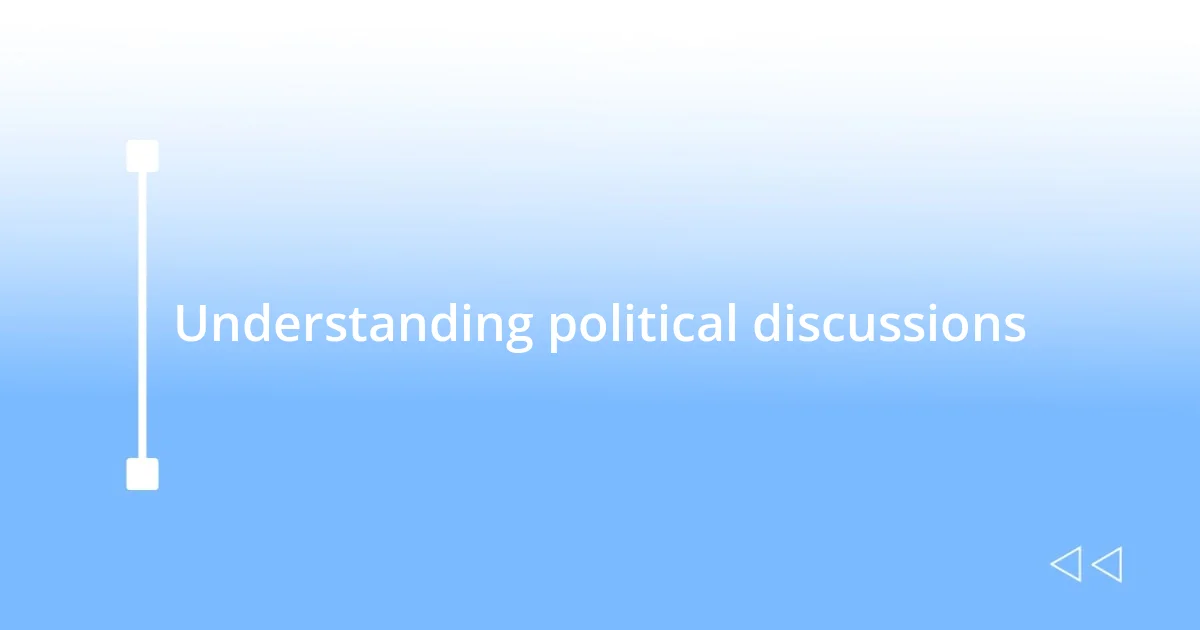
Understanding political discussions
Political discussions can feel like navigating a maze, filled with differing opinions and heated emotions. I remember the first time I joined a group discussion about a local election; the energy in the room was palpable, and I found myself both excited and anxious. What makes these conversations so intense? It’s the personal stakes and beliefs that people hold dear, often tied closely to their identities.
As I’ve engaged in political discussions over the years, I’ve realized that understanding the underlying motivations of others is crucial. For example, during a debate about healthcare reform, one participant shared a personal story about a relative struggling to access care. This moment shifted the dialogue entirely, reminding me that facts can only go so far; personal experiences often resonate more deeply. How do we honor those stories while also sharing our own perspectives?
Exploring differing viewpoints allows me to expand my understanding and empathize with others. I often find myself asking, “What experiences shaped their beliefs?” This question encourages a deeper dive beyond surface opinions, fostering a more meaningful conversation. In my experience, these discussions can transform into powerful exchanges, highlighting the importance of listening and connecting on a human level.

Establishing common ground
To establish common ground in political discussions, I often start by identifying shared values and interests. For instance, during a recent conversation about immigration reform, I found that both my colleague and I valued the importance of community safety. By emphasizing this mutual concern, the tone shifted from confrontation to collaboration. Isn’t it interesting how common values can bridge even the most polarized opinions?
While discussing common ground, personal experiences play an integral role. I remember a lively discussion where someone expressed their frustration about environmental policies. Instead of debating the policies themselves, I shared my own passion for nature and how it drives my views on conservation. This connection made the conversation more relatable and opened the door for respectful dialogue. It’s amazing how connecting on a personal level can lead to deeper, more productive conversations.
Ultimately, establishing common ground is about listening and adapting. I’ve learned that asking questions like, “What matters most to you?” can unveil shared priorities. This simple inquiry often leads to a more constructive exchange, as it invites others to share their stories, creating a rich tapestry of understanding. How often do we take the time to seek out those connections in discussions about sensitive topics?
| Strategy | Example |
|---|---|
| Identify shared values | Discussing community safety in immigration talks |
| Use personal experiences | Sharing a love for nature in conservation debates |
| Ask engaging questions | “What matters most to you?” to foster connection |
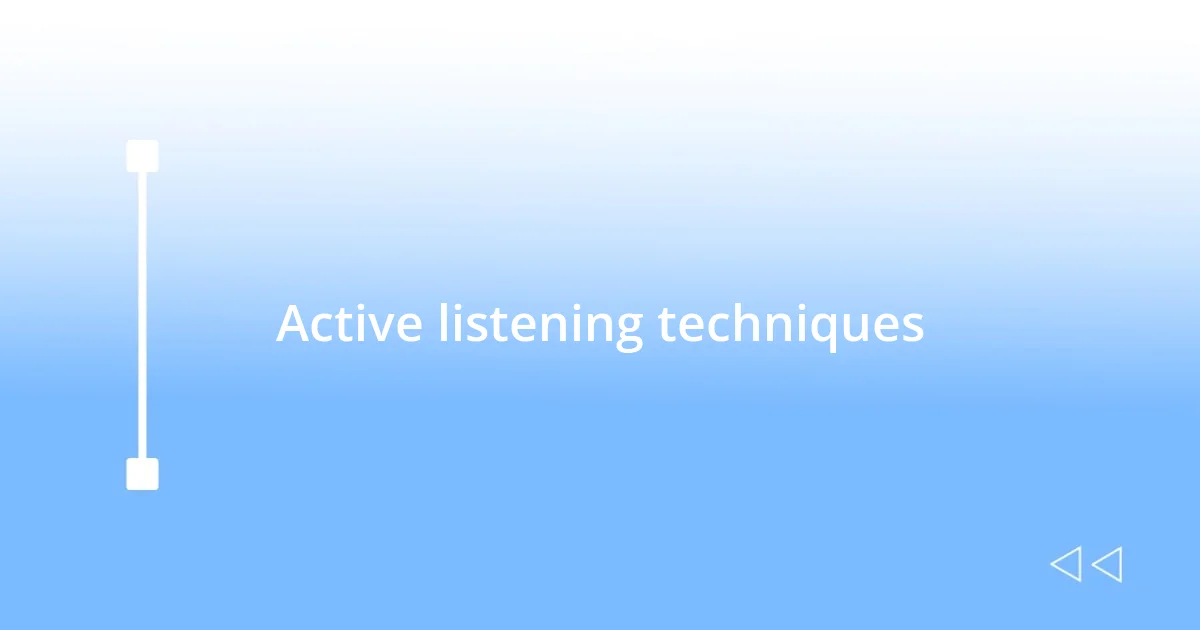
Active listening techniques
Active listening is a game-changer in political discussions. When I truly focus on what someone is saying, I often catch subtle nuances that can completely transform my understanding. I remember a heated debate where I initially focused on formulating my response rather than listening. Once I switched to attentive listening, I realized the speaker was sharing their fears about economic stability, not just voicing a political opinion. This shift in perspective helped me respond with empathy rather than defensiveness.
- Maintain eye contact: This simple act shows you value the speaker’s words.
- Paraphrase their points: Reflecting what someone said can validate their feelings, like saying, “It sounds like you’re worried about job security.”
- Pause before responding: Taking a moment to think about their perspective helps diffuse tension and showcases your engagement.
Incorporating silence strategically also enhances active listening. Once, during a discussion on social justice, I remained quiet after my colleague shared a poignant experience of discrimination. The silence felt palpable, yet it led to a deeper conversation where others began to share their stories. It’s fascinating how a little pause can encourage more voices to enter the dialogue, transforming a monologue into a more enriching conversation.
- Ask clarifying questions: “Can you elaborate on what you mean by that?” opens avenues for deeper exploration.
- Acknowledge emotions: Statements like, “That sounds really frustrating,” validate the speaker’s feelings and encourage honesty.
- Stay open-minded: Being ready to adjust your viewpoint can foster a more genuine connection, leading to collaborative discussions.
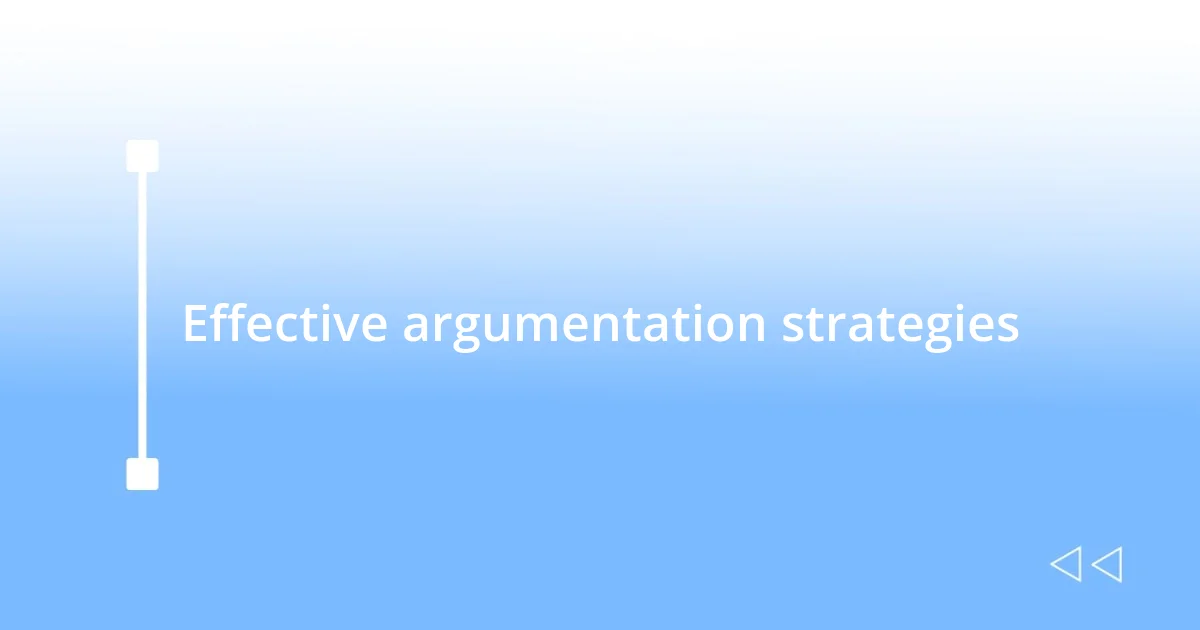
Effective argumentation strategies
Effective argumentation is about more than just making points; it’s about structuring those points for maximum impact. I often find that using the “sandwich” approach works wonders. By starting with a positive comment, presenting my argument, and then concluding with another affirmative statement, I create an environment where my message is more likely to be received. It feels good to have my thoughts acknowledged while still pushing the conversation forward.
One time, during a discussion about tax reforms, I framed my argument around the benefits rather than the perceived negatives. I began by highlighting the importance of supporting small businesses, suggested ways the reforms might help spur growth, and wrapped up by acknowledging the challenges some individuals might face. This approach not only made my position clearer but also invited others to share their perspectives. Have you ever noticed how a positive framing can redefine the energy of a conversation?
Another essential strategy is to back up my arguments with credible sources. I remember engaging in a discussion on educational policy where I referenced a recent study comparing educational outcomes in different funding models. Sharing data doesn’t just make my case stronger; it speaks to my commitment to informed dialogue. Knowing that my claims stem from solid evidence lends confidence to the conversation, encouraging others to do the same. How often do we consider the impact of credible information on evening out the discourse?
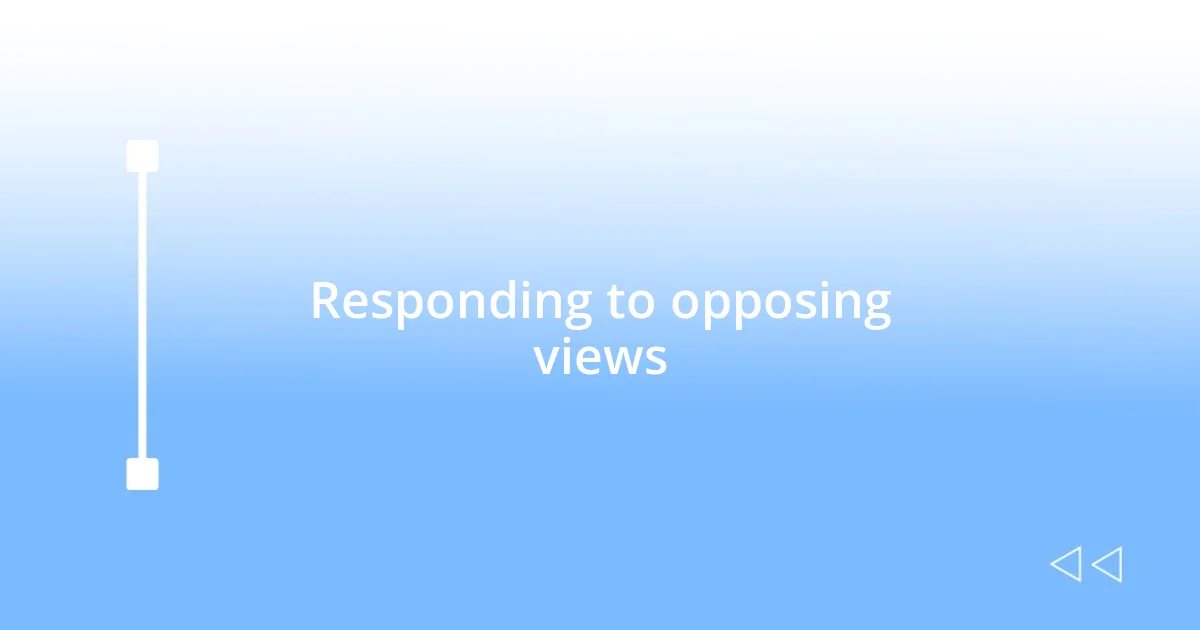
Responding to opposing views
Responding to opposing views can feel daunting, but I’ve learned that approaching these conversations with curiosity often leads to mutual understanding. I vividly recall discussing immigration policies with a friend who held a starkly different perspective. Rather than dismissing his beliefs, I asked him what personal experiences shaped his viewpoint. His stories added depth to our dialogue, transforming what could have been a heated argument into a thoughtful exchange. How often do we miss those opportunities to learn simply by asking questions?
In situations where emotions run high, acknowledging the other person’s feelings can be incredibly powerful. I once debated environmental regulations with a colleague who was visibly upset about potential job losses in our area. Instead of countering with statistics right away, I paused and said, “I can see how worried you are about this. That’s a valid concern.” This acknowledgment helped reduce tension. Have you noticed that sometimes just seeing the humanity in someone else’s worries can pave the way for a more productive discussion?
Lastly, I’ve discovered that responding with respect, even when I disagree, cultivates a more constructive dialogue. During a discussion about healthcare, I had a chance to engage with someone advocating for a totally different system than mine. I chose to express appreciation for their passion before sharing my thoughts. This respectful approach not only kept the conversation civil but also opened the door for our differing views to coexist. Isn’t it interesting how respect can turn potential conflict into a collaborative exploration of ideas?
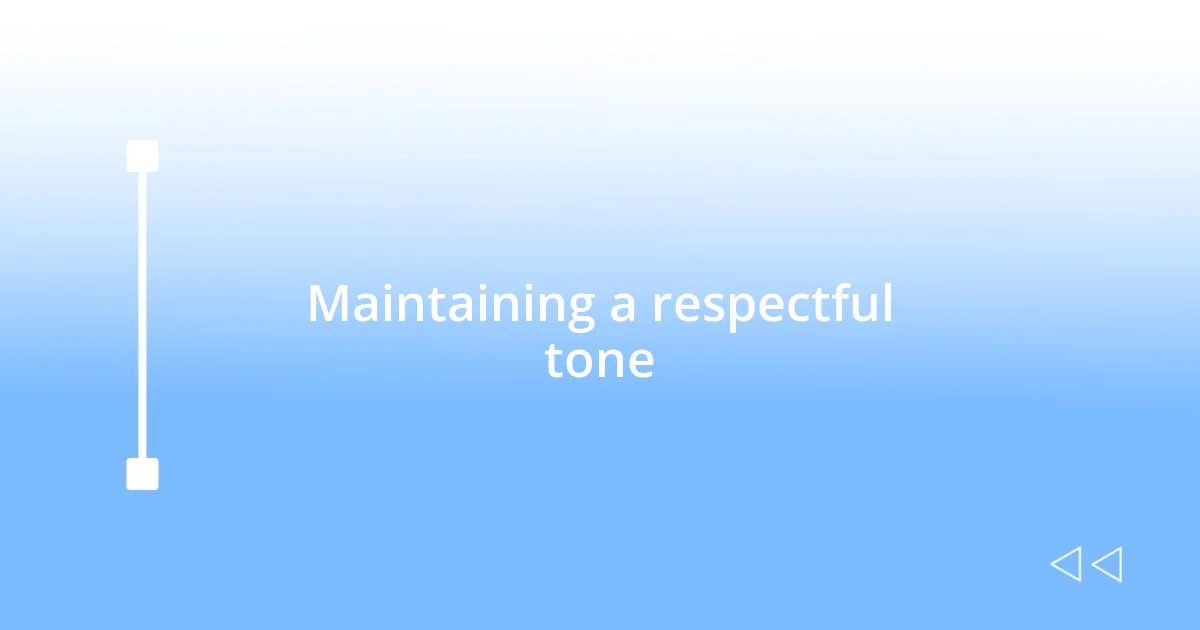
Maintaining a respectful tone
Maintaining a respectful tone is vital in political discussions. I once attended a community forum about local governance, and I noticed how the moderator’s respectful tone set the stage for constructive dialogue. It reminded me that when I approach conversations without hostility, I create space for open and honest exchanges. Have you felt the difference when someone speaks kindly, even amidst disagreement?
I’ve experienced moments where maintaining respect felt challenging, especially during a heated debate about climate change. I vividly remember countering a friend’s harsh critique of renewable energy with, “I understand you’re frustrated about the costs involved; it’s a tough issue for many.” This acknowledgment didn’t just soften the atmosphere; it led us into a deeper discussion, revealing common fears and hopes. Isn’t it curious how a little empathy can change the course of a conversation?
When I focus on respect, the conversation’s energy shifts positively. After one particularly tough discussion on healthcare, where I felt defensive, I realized that expressing gratitude for the opposing viewpoint helped me regroup. Instead of arguing my point aggressively, I said, “I appreciate your perspective; it really challenges my thinking.” That simple comment transformed our interaction, fostering a sense of collaboration over competition. Don’t you agree that fostering a respectful exchange is key to not only understanding differing opinions, but also strengthening our own?
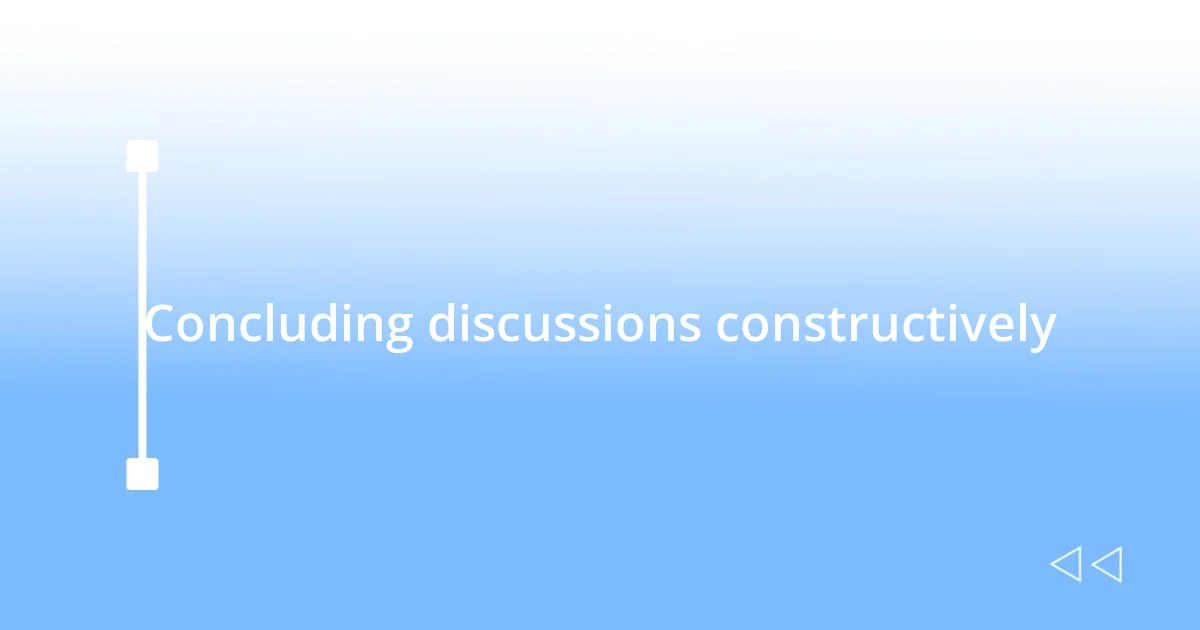
Concluding discussions constructively
Concluding discussions constructively is an art I’ve come to appreciate over time. I remember wrapping up a debate on education reform where we had wandered through various arguments. Instead of ending on a contentious note, I suggested, “Let’s take what we’ve both shared today and think about how it impacts our community.” This shift encouraged us to reflect on our insights, turning a potentially awkward farewell into a promise to continue the conversation.
When closing a discussion, I find it helpful to summarize the key points we’ve both raised. For instance, after an intense conversation about taxation, I stated, “We both care deeply about supporting our community and can agree that the way we do this can vary.” By recognizing our shared values, even amidst disagreement, I felt a sense of solidarity instead of division. How often do we overlook the importance of these common grounds?
Lastly, leaving the door open for future dialogue can transform a conclusion into an invitation for ongoing exploration. I once ended a discussion on healthcare by saying, “I’m keen to hear more about your experiences with the system; let’s keep this conversation alive.” This not only reinforced respect but also made the other person feel valued. How powerful is it to know that a single conversation can blossom into a deeper relationship?












